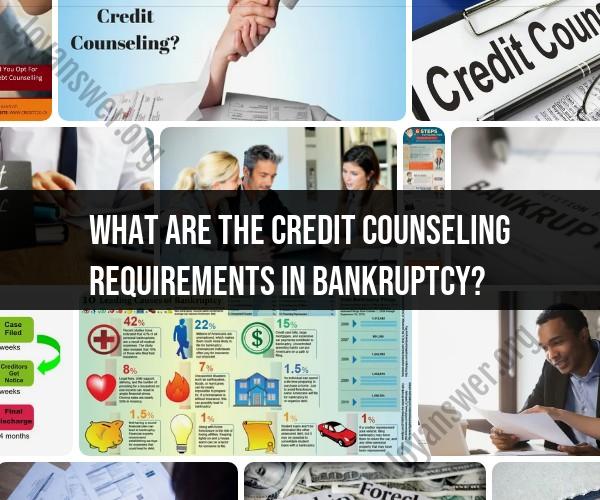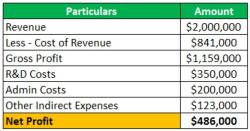What are the credit counseling requirements in bankruptcy?
The credit counseling requirements in bankruptcy, mandated by the U.S. Bankruptcy Code, are designed to help individuals better understand their financial situation and explore alternatives to bankruptcy before filing. Here's what you need to know about these requirements:
1. Pre-Bankruptcy Credit Counseling:
- Before filing for bankruptcy, you must complete a credit counseling course from a government-approved agency within 180 days (approximately six months) prior to filing your bankruptcy petition. This course is often referred to as "pre-bankruptcy counseling" or "credit counseling."
2. Course Content:
- The pre-bankruptcy credit counseling course typically covers topics related to personal finance, budgeting, credit management, and alternatives to bankruptcy. It aims to help you assess your financial situation, explore potential solutions, and make an informed decision about whether bankruptcy is the right option for you.
3. Approved Agencies:
- It's essential to select a credit counseling agency that has been approved by the U.S. Trustee Program, which is part of the Department of Justice. The U.S. Trustee Program maintains a list of approved agencies on its website.
4. In-Person, Online, or Telephone Counseling:
- Credit counseling agencies offer their services through various formats, including in-person sessions, online courses, or telephone counseling. You can choose the format that best suits your needs and preferences.
5. Certificate of Completion:
- After completing the credit counseling course, you will receive a certificate of completion. You must include this certificate when you file your bankruptcy petition. Without it, your bankruptcy case may be dismissed.
6. Timing of Filing:
- You can file your bankruptcy petition after completing the credit counseling course. Be sure to file within 180 days of completing the course, as the certificate has an expiration date.
7. Exceptions and Extensions:
- In some cases, individuals may qualify for an exemption from the credit counseling requirement or an extension of the deadline to complete the course. For example, if you face urgent circumstances, such as impending foreclosure, you may be granted an extension.
8. Post-Bankruptcy Debtor Education:
- After you file for bankruptcy, you are required to complete a second financial education course known as "debtor education" or "post-bankruptcy counseling." This course focuses on financial management and budgeting skills and is intended to help you make sound financial decisions after bankruptcy.
9. Discharge Eligibility:
- To receive a discharge (the legal elimination of your eligible debts) in bankruptcy, you must complete both the pre-bankruptcy credit counseling and post-bankruptcy debtor education courses.
Compliance with the credit counseling requirements is an important step in the bankruptcy process. It ensures that individuals have access to financial education and resources that may help them manage their finances more effectively. However, it's essential to work with a bankruptcy attorney or advisor to navigate the bankruptcy process, including the credit counseling and debtor education requirements, to ensure that you meet all legal obligations and maximize the benefits of bankruptcy if it's the right option for your financial situation.
Financial Recovery After Bankruptcy: Credit Counseling Requirements
Bankruptcy can be a difficult experience, but it can also be a fresh start. After bankruptcy, it is important to take steps to rebuild your credit and financial future. One of the first steps you should take is to complete credit counseling.
Credit counseling is a requirement for all bankruptcy filers. Credit counseling can help you to understand your finances, develop a budget, and create a plan for rebuilding your credit.
Bankruptcy and Credit Counseling: What You Need to Know
Credit counseling is a confidential process that is conducted by a certified credit counselor. Credit counselors can help you to:
- Understand your finances
- Develop a budget
- Create a plan for rebuilding your credit
- Learn about different types of credit
- Manage your debt
Credit counseling is a valuable resource for anyone who is struggling with debt or who is considering bankruptcy.
Meeting Credit Counseling Requirements in a Bankruptcy Case
To meet the credit counseling requirements in a bankruptcy case, you must complete a credit counseling session with a certified credit counselor from an approved agency. You can find a list of approved credit counseling agencies on the website of the United States Trustee Program.
The credit counseling session must cover the following topics:
- The causes of your financial problems
- Budgeting
- Credit management
- Debt repayment options
- Bankruptcy
Once you have completed the credit counseling session, you will receive a certificate of completion. You must file this certificate with the bankruptcy court before your bankruptcy case can be filed.
Credit counseling is an important step in the bankruptcy process. It can help you to understand your finances, develop a plan for rebuilding your credit, and make a fresh start.
Here are some additional tips for meeting credit counseling requirements in a bankruptcy case:
- Schedule your credit counseling session early. This will give you enough time to complete the session and receive your certificate of completion before your bankruptcy case is filed.
- Be honest with your credit counselor. The credit counselor is there to help you, and they cannot do that if you are not honest with them.
- Participate in the credit counseling session. The credit counselor will provide you with valuable information and advice. Be sure to pay attention and ask questions.
- Follow the advice of your credit counselor. The credit counselor can help you to develop a budget and create a plan for rebuilding your credit. By following their advice, you can make a fresh start and achieve your financial goals.












